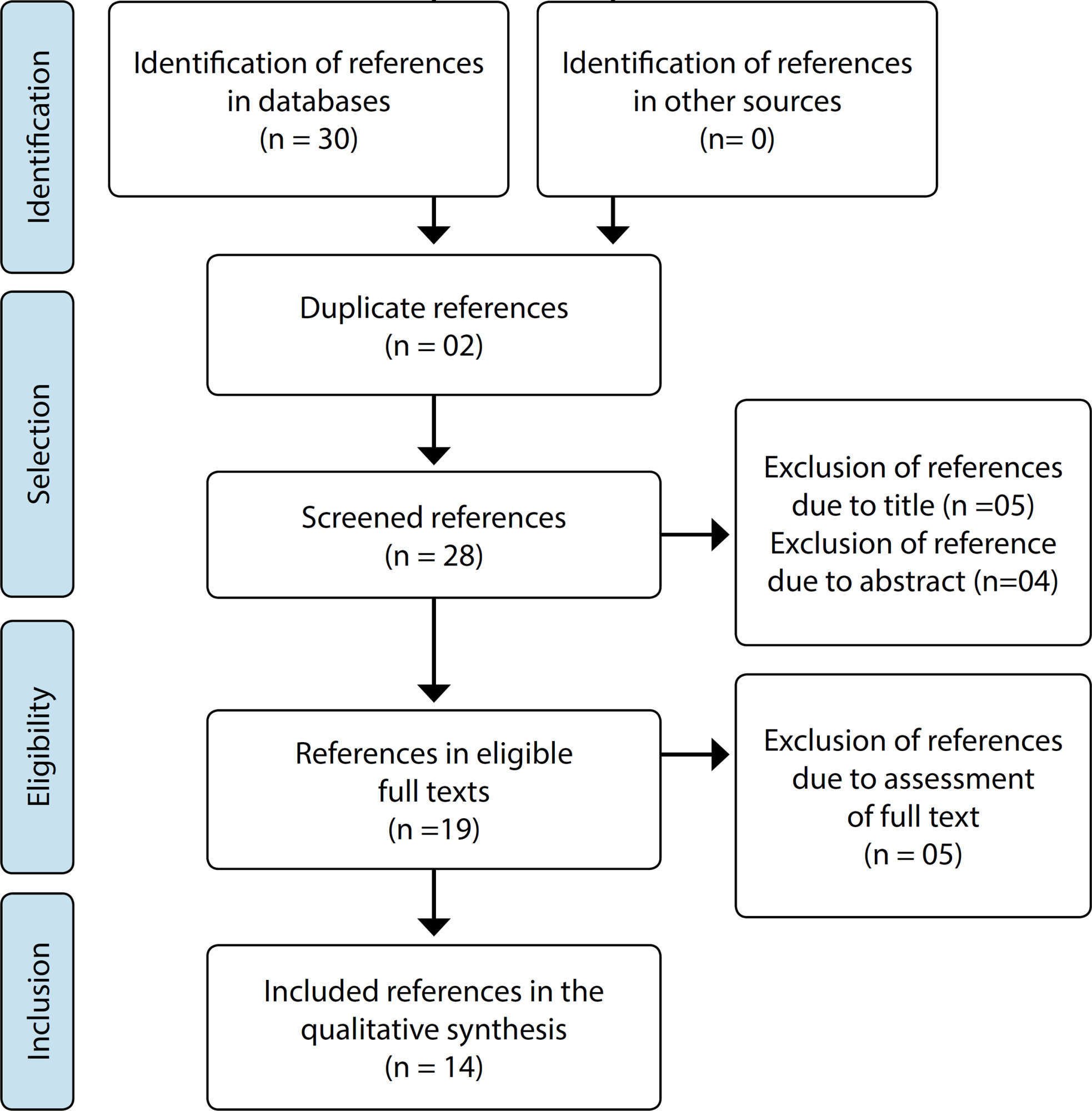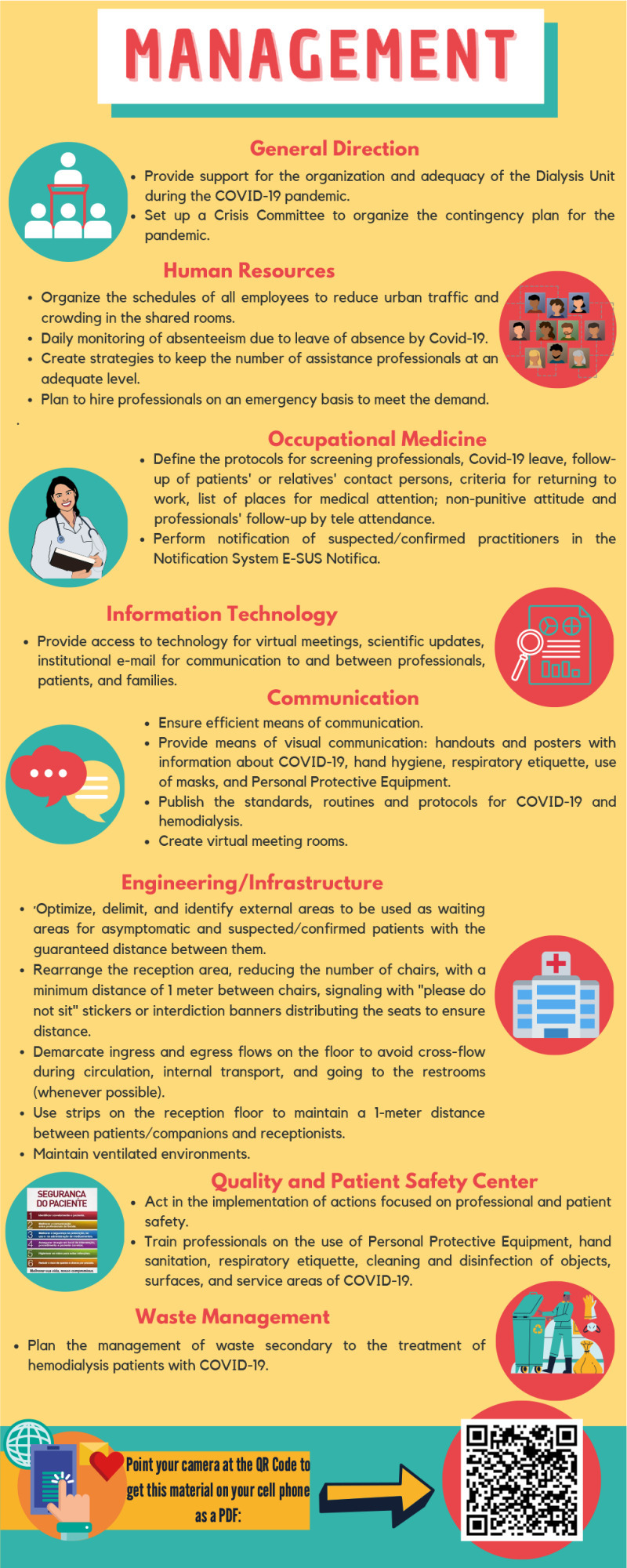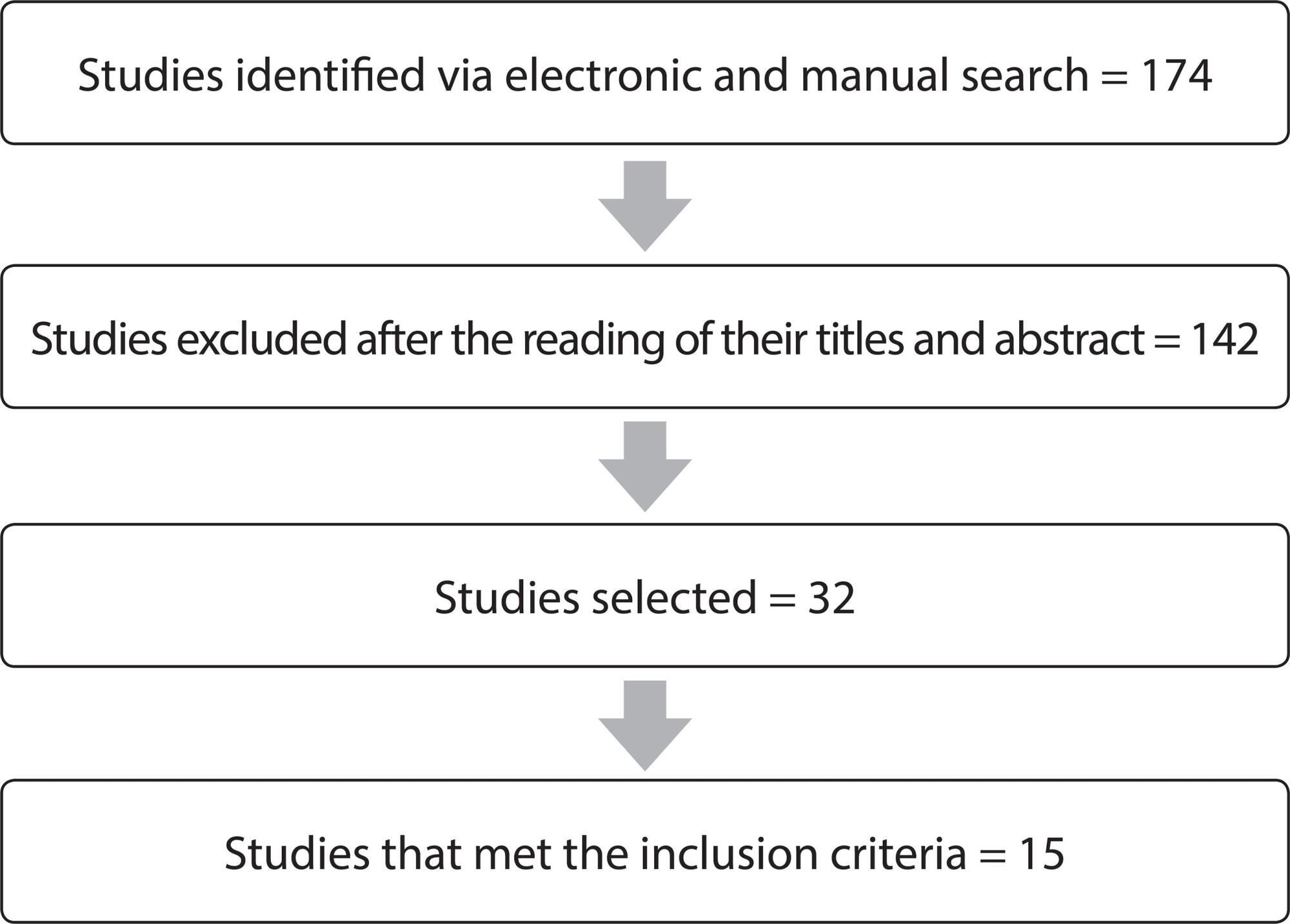-
REVIEW09-29-2022
Palliative care in Primary Health Care: an integrative literature review
Revista Brasileira de Enfermagem. 2022;75(1):e20201335
Abstract
REVIEWPalliative care in Primary Health Care: an integrative literature review
Revista Brasileira de Enfermagem. 2022;75(1):e20201335
DOI 10.1590/0034-7167-2020-1335
Views0See moreABSTRACT
Objectives:
to analyze scientific evidence on the implementation and performance of palliative care in Primary Health Care.
Methods:
an integrative literature review, according to the Preferred Reporting Items for Systematic Reviews and Meta-Analyses, carried out in the PubMed, SciVerse Scopus and LILACS databases, in December 2020, without a time frame.
Results:
22 original scientific articles were analyzed, 14 classified as evidence level VI. The objective was to understand the experiences and roles of professionals, patients and families on palliative care in Primary Health Care, articles focused on the theme of management and organization of health services and on the importance of educational interventions on the subject.
Final Considerations:
evidence found relating palliative care in Primary Health Care points to the possibility of this care; health teams work closely with the family and their home, but the need to expand this theme is still perceived.

-
REVIEW09-29-2022
Children with congenital heart disease in COVID-19 pandemic times: an integrative review
Revista Brasileira de Enfermagem. 2022;75(1):e20201033
Abstract
REVIEWChildren with congenital heart disease in COVID-19 pandemic times: an integrative review
Revista Brasileira de Enfermagem. 2022;75(1):e20201033
DOI 10.1590/0034-7167-2020-1033
Views0See moreABSTRACT
Objective:
to identify the scientific production in health about children with congenital heart disease in COVID-19 pandemic times.
Method:
this is an integrative review, carried out in June 2020 in the information resources Latin American and Caribbean Literature in Health Sciences (LILACS), National Library of Medicine, National Institutes of Health (PubMed), Scientific Electronic Library Online Journal Portal (SciELO) and Brazilian Institute of Information Science and Technology (Oasis Ibict).
Results:
14 studies composed this review. Most studies pointed to tests, interventional procedures and surgery for children with heart disease in pandemic times; others discussed possible complications of COVID-19 among children with congenital heart disease.
Conclusion:
the incipient production of studies and the weak level of evidence denote an important knowledge gap so far, highlighting the need for studies with strong scientific evidence for the formulation of care guidelines aimed at children with heart disease.

-
ORIGINAL ARTICLE09-29-2022
Palliative care production for health professionals in the context of home care
Revista Brasileira de Enfermagem. 2022;75(1):e20210030
Abstract
ORIGINAL ARTICLEPalliative care production for health professionals in the context of home care
Revista Brasileira de Enfermagem. 2022;75(1):e20210030
DOI 10.1590/0034-7167-2021-0030
Views1See moreABSTRACT
Objectives:
to analyze palliative care production developed by health professionals to home care patients.
Methods:
this is an exploratory study, with a qualitative approach, using the transpersonal care theoretical framework. Thirteen interviews were conducted with health professionals and 18 observations were conducted on different cases. Content analysis was performed using MAXQDA©.
Results:
actions performed: maintenance and follow-up measures to people eligible for palliative care, in acts of dialogue and “listening” to caregivers and users, conducting guidelines for the care and self-care process, performing technical procedures, delivery of materials, referrals and medical prescriptions to users.
Final Considerations:
it is perceived the need for advances in the implementation of government policies in Brazil that insert palliative care into the Health Care Network through educational, managerial and care actions that ensure human dignity, thus allowing the development of these and other palliative care interventions.
-
ORIGINAL ARTICLE09-29-2022
Incidence of acute radiodermatitis in women with breast cancer undergoing hypofractionated radiotherapy
Revista Brasileira de Enfermagem. 2022;75(1):e20210118
Abstract
ORIGINAL ARTICLEIncidence of acute radiodermatitis in women with breast cancer undergoing hypofractionated radiotherapy
Revista Brasileira de Enfermagem. 2022;75(1):e20210118
DOI 10.1590/0034-7167-2021-0118
Views0See moreABSTRACT
Objective:
To estimate the incidence and degree of acute radiodermatitis at the end and after the end of treatment in women with breast cancer undergoing hypofractionated radiotherapy.
Methods:
Observational, prospective, and longitudinal study, conducted between March 2019 and January 2020, in a radiotherapy outpatient clinic.
Results:
Thirty-two women participated in the study, among whom, in the last session of hypofractionated radiotherapy, 15 (46.9%) had radiodermatitis, erythema in 13 (40.6%), and wet peeling in 2 (6.3%). In the post-treatment evaluation, 27 (84.4%) had radiodermatitis, erythema in 17 (53.1%), dry peeling in 8 (25%), and wet peeling in 2 (6.3%).
Conclusion:
The general incidence of radiodermatitis after hypofractionated radiotherapy in women with breast cancer was 37.5%, erythema, 12.5%, and dry peeling, 25%. The development of care protocols for the management of radiodermatitis after treatment is of paramount importance.
-
ORIGINAL ARTICLE09-29-2022
Neither angels nor heroes: nurse speeches during the COVID-19 pandemic from a Foucauldian perspective
Revista Brasileira de Enfermagem. 2022;75:e20201329
Abstract
ORIGINAL ARTICLENeither angels nor heroes: nurse speeches during the COVID-19 pandemic from a Foucauldian perspective
Revista Brasileira de Enfermagem. 2022;75:e20201329
DOI 10.1590/0034-7167-2020-1329
Views1See moreABSTRACT
Objective:
to analyze the processes of meaning production, based on the speeches of nursing professionals, about how they feel about the titles of “angels and heroes” given by society during the pandemic of COVID-19.
Methods:
a qualitative, documentary research. Data was collected in October and November 2020 and analyzed from the perspective of the Discourse Analysis proposed by Michel Foucault.
Results:
they were organized into two thematic categories: “Angels and heroes? The (not) heroic reality of nursing during the pandemic” and “The search for recognition of the professional work of nursing: between what is said and what is not said”.
Final considerations:
the nurses’ speeches enunciate the search for decent conditions for the execution of care, fair wages, and recognition of the professional work by society.
-
EXPERIENCE REPORT09-29-2022
Mobile pre-hospital care reorganization during the COVID-19 pandemic: experience report
Revista Brasileira de Enfermagem. 2022;75:e20200826
Abstract
EXPERIENCE REPORTMobile pre-hospital care reorganization during the COVID-19 pandemic: experience report
Revista Brasileira de Enfermagem. 2022;75:e20200826
DOI 10.1590/0034-7167-2020-0826
Views0See moreABSTRACT
Objective:
To describe the reorganization of Belo Horizonte’s Mobile Emergency Care Service during the new coronavirus pandemic using the Plan Do-Check-Act quality tool.
Methods:
Descriptive study, of the experience report type, on the reorganization of care in a mobile pre-hospital care service during the new coronavirus pandemic, from March to July 2020. The Plan-Do-Check-Act quality tool was applied for the process.
Results:
Preparation of care protocol, meetings, training, addition of ambulances, hiring of professionals, and other actions were carried out, with subsequent evaluation and monitoring. When failures or new needs were identified, actions and changes were implemented while keeping monitoring and evaluation during the work routine.
Final considerations:
The reorganization of the service through the construction of a protocol and using the Plan-Do-Check-Act as a management tool was essential to promote safe care for professionals and patients.

-
REFLECTION09-29-2022
Health care of deaf persons during coronavirus pandemics
Revista Brasileira de Enfermagem. 2022;75:e20201036
Abstract
REFLECTIONHealth care of deaf persons during coronavirus pandemics
Revista Brasileira de Enfermagem. 2022;75:e20201036
DOI 10.1590/0034-7167-2020-1036
Views0See moreABSTRACT
Objective:
To reflect about the barriers experienced by the deaf population during the COVID-19 pandemic, the proposals to overcome communication barriers in health care and the role of public policies in effecting the social inclusion of deaf people.
Methods:
Reflection based on studies on health care for deaf people, the COVID-19 pandemic and public accessibility policies.
Results:
The global crisis of COVID-19 has deepened pre-existing inequalities in the world, in addition to highlighting the vulnerability of people with disabilities, including deaf. Government, institutional and social initiatives to mitigate difficulties in communicating to deaf people have been made, but they are still insufficient to guarantee protection for them in this pandemic and full inclusion in health care.
Final considerations:
Social inclusion, supported by law, and the linguistic accessibility of deaf people still need to generate broad and concrete actions so that deaf people can enjoy their rights as citizens.
-
REFLECTION09-29-2022
Hemodialysis in the context of COVID-19: care, nursing protagonism and quality
Revista Brasileira de Enfermagem. 2022;75:e20201077
Abstract
REFLECTIONHemodialysis in the context of COVID-19: care, nursing protagonism and quality
Revista Brasileira de Enfermagem. 2022;75:e20201077
DOI 10.1590/0034-7167-2020-1077
Views0See moreABSTRACT
Objective:
To reflect on the need to reorganize satellite dialysis units to ensure the safety of patients and workers, focusing on minimizing the risk of contamination by SARS-CoV-2.
Methods:
Reflection considering the guidelines of international and Brazilian institutions and scientific articles, with a view to possible adaptations to the Brazilian reality.
Results:
The actions suggested and adapted by Dialysis Units from different countries during the pandemic focus on the quality of care and safety of the patient and workers. There was an opportunity to reflect on these actions using the Donabedian Model for quality of care and highlight the nursing team’s role in this context.
Final considerations:
The focus on quality and safety related to institutionalized processes and the assessment through indicators can contribute to the management of the outpatient dialysis unit in the context of COVID 19.

-
07-12-2021
Coping strategies, concerns, and habits of Brazilian men in the COVID-19 context
Revista Brasileira de Enfermagem. 2021;74:e20210040
Abstract
Coping strategies, concerns, and habits of Brazilian men in the COVID-19 context
Revista Brasileira de Enfermagem. 2021;74:e20210040
DOI 10.1590/0034-7167-2021-0040
Views0See moreABSTRACT
Objective:
To describe coping strategies, concerns and habits of Brazilian men during the COVID-19 pandemic.
Method:
Cross-sectional, descriptive and nationwide study, carried out in 2020 with a total of 1015 men living in Brazil. A descriptive statistic was used.
Results:
Young (41.2%), black (61.4%), highly educated (66.8%), high income (33.2%), living with family/friends (49.7%) and formal workers (65.6%) predominated. As coping strategies predominated: exclusive use of the private health system (36.4%), support from family/friends (78.2%) and leisure (97.7%) and domestic activities (64.9 %). Social distancing (59.7%), economic (58.0%) and work situations (44.4%) were the main reasons for concern. Among the prevention/control attitudes, hand washing (94.3%) and social distancing (91.0%) prevailed. Media consumption (84.6%) and health risk (65.4%) were the main increased habits.
Conclusion:
Brazilian men adopted coping strategies recommended by health authorities, with concerns and habits of potential risk to physical and mental health.
-
ORIGINAL ARTICLE03-24-2021
Costs of healthcare-associated infections in an Intensive Care Unit
Revista Brasileira de Enfermagem. 2021;74(1):e20200275
Abstract
ORIGINAL ARTICLECosts of healthcare-associated infections in an Intensive Care Unit
Revista Brasileira de Enfermagem. 2021;74(1):e20200275
DOI 10.1590/0034-7167-2020-0275
Views1See moreABSTRACT
Objectives:
to evaluate hospitalization costs of patients with and without Healthcare-Associated Infections an Intensive Care Unit.
Methods:
a retrospective case-control study. Data collection was retrieved from the medical records of Intensive Care Unit of a medium-sized public hospital in Goiás-Brazil. For each case, two controls were selected. Data on socioeconomic, clinical, and hospital costs were collected. To verify associations between variables, Odds Ratio and linear regression were calculated.
Results:
a total of 21 patients diagnosed with Healthcare-Associated Infections and 42 controls were evaluated. The hospitalization cost for patients with infection was four times higher than for non-infection patients (p-value<0.001). There was an association between infection and higher mortality (p-value <0.001), longer hospital-stay (p-value =0.021), and higher hospital costs (p-value =0.007).
Conclusions:
hospitalization costs of diagnosed Healthcare-Associated Infections patients are high compared to those who do not have this diagnosis.

-
ORIGINAL ARTICLE06-01-2020
Occupational stress of nurses from the Mobile Emergency Care Service
Revista Brasileira de Enfermagem. 2020;73:e20180898
Abstract
ORIGINAL ARTICLEOccupational stress of nurses from the Mobile Emergency Care Service
Revista Brasileira de Enfermagem. 2020;73:e20180898
DOI 10.1590/0034-7167-2018-0898
Views0See moreABSTRACT
Objective:
To evaluate stress, and to associate it with sociodemographic and clinical aspects of nurses from the Mobile Emergency Care Service.
Method:
This is an observational, cross-sectional and quantitative study conducted with 123 nurses, who answered a questionnaire to assess sociodemographic and clinical variables, and the Job Stress Scale, which evaluates stress in the workplace.
Results:
The results indicated that most of them were women, 20 to 40 years old, married, without another employment bond and with specialization course. They had low control and low demand at work and performed a passive work. Women reported passive work and high stress levels, while men were equally divided in active and passive work with low stress levels.
Conclusion:
Passive work is harmful to health and it is related to lack of autonomy, decision-making, and social support. It may lead to reduced ability to solve problems faced in daily work routine.
-
ORIGINAL ARTICLE12-05-2019
Gerontotechnology for fall prevention of the elderly with Parkinson
Revista Brasileira de Enfermagem. 2019;72:243-250
Abstract
ORIGINAL ARTICLEGerontotechnology for fall prevention of the elderly with Parkinson
Revista Brasileira de Enfermagem. 2019;72:243-250
DOI 10.1590/0034-7167-2018-0704
Views0See moreABSTRACT
Objective:
to develop the gerontological nursing care process among the elderly with Parkinson’s disease, aiming at the promotion of health through the creation of gerontotechnologies for fall prevention.
Method:
Convergent Care Research was used as a methodological route. Data were collected from February to October 2017, with the participation of nine elderly people with Parkinson’s disease. An educational booklet, a memory game called “não cai istepô”, a memory game called “caiu de maduro” were developed through clinical evaluation through scales, recorded semi-structured interview and workshops.
Results:
the application of gerontotechnology resulted from the elderly in self-care, empowerment and knowledge through play, revealing interest in behavior change, independence and learning, as well as serving as a facilitator of care.
Conclusion:
the gerontotechnologies presented as a playful and innovative instrument for the nursing gerontological care process.
-
ORIGINAL ARTICLE07-08-2020
Self-medication practices in riverside communities in the Brazilian Amazon Rainforest
Revista Brasileira de Enfermagem. 2020;73(5):e20190432
Abstract
ORIGINAL ARTICLESelf-medication practices in riverside communities in the Brazilian Amazon Rainforest
Revista Brasileira de Enfermagem. 2020;73(5):e20190432
DOI 10.1590/0034-7167-2019-0432
Views0INTRODUCTIONThe Brazilian Amazon rainforest has an area of approximately 5 million km2, with important climatic, social and economic variations that can impact the profile of morbidity and the use of medicines. The epidemiological profile of the Amazonian population is quite heterogeneous, including vector-borne diseases, such as malaria, dengue, cutaneous leishmaniasis and Diseases Related to Inadequate […]See more -
09-16-2019
Sociodemographic and health profile of TB/HIV co-infection in Brazil: a systematic review
Revista Brasileira de Enfermagem. 2019;72(5):1389-1396
Abstract
Sociodemographic and health profile of TB/HIV co-infection in Brazil: a systematic review
Revista Brasileira de Enfermagem. 2019;72(5):1389-1396
DOI 10.1590/0034-7167-2018-0285
Views0See moreABSTRACT
Objective:
to ascertain the epidemiological profile of TB/HIV co-infection in Brazilian scenarios.
Method:
this is a systematic review conducted via electronic search in databases PubMed, EMBASE, LILACS and SciELO, having as inclusion criterion articles based on the Brazilian scenario of TB/HIV co-infection.
Results:
of the total 174 studies, 15 were selected, revealing the epidemiological profile of the co-infection in different scenarios: male, economically active age, low education level, brown/black ethnicity, low income, heterosexual, pulmonary clinical form, alcoholism and Directly Observed Therapy.
Conclusion:
the sociodemographic and epidemiological profile of people with TB/HIV co-infection has an expected occurrence pattern, which corroborates articles found in the literature, either at national level or by grouping the studies according to region or state.

-
ORIGINAL ARTICLE05-21-2021
Music in the relief of stress and distress in cancer patients
Revista Brasileira de Enfermagem. 2021;74(2):e20190838
Abstract
ORIGINAL ARTICLEMusic in the relief of stress and distress in cancer patients
Revista Brasileira de Enfermagem. 2021;74(2):e20190838
DOI 10.1590/0034-7167-2019-0838
Views0See moreABSTRACT
Objectives:
to evaluate the effects of music on the physiological stress and distress of cancer patients being treated in a hospital.
Methods:
quasi-experimental study carried out with cancer patients hospitalized in the nursing wards of a public hospital. There was a single 15-minute intervention using music. It was individual, and headphones were used for patients to listen to three songs chosen by each one. The levels of stress and distress were measured before and after the intervention, using music to analyze the cortisol in the saliva and the answers to the distress thermometer. The significance level of the statistical analysis was 5%, using the non-parametric Wilcoxon test.
Results:
the mean age of the 26 patients was 56 years old. Most were female, white, and had breast cancer. After intervention, there were statistically significant diminutions in both stress and distress — p < 0.001.
Conclusions:
the use of music diminishes the stress and the distress of cancer patients.

-
ORIGINAL ARTICLE08-19-2019
Suffering and defense in work in a mental health care service
Revista Brasileira de Enfermagem. 2019;72(4):903-909
Abstract
ORIGINAL ARTICLESuffering and defense in work in a mental health care service
Revista Brasileira de Enfermagem. 2019;72(4):903-909
DOI 10.1590/0034-7167-2018-0140
Views0See moreABSTRACT
Objective:
to know the suffering and the strategies of defense of CAPS AD III workers, from the perspective of the Work Theater proposed by Dejours.
Method:
a descriptive qualitative research, of the case study type, with CAPS AD III workers, using as theoretical framework the Psychodynamics of Work.
Results:
CAPS AD III professionals identify that the suffering in the work arises from the frustration between the real and the prescribed one; by the hegemony of practices guided by the biomedical model; stigmatization and prejudice with users; and the limitations of the Health Care Network (Rede de Atenção à Saúde). As an individual defense strategy, the rationalization was defined, and as a collective strategy, the protection strategy.
Final considerations:
worker uses strategies of defenses to face suffering and give a new meaning to it, characterizing themselves as ways of apprehending, understanding and giving meaning and new looks to their work.
Search
Search in:
Nuvem de Tags
Adolescente (85) Atenção Primária à Saúde (239) COVID-19 (91) Criança (91) Cuidados de Enfermagem (269) Educação em Enfermagem (151) Educação em Saúde (139) Enfermagem (930) Enfermagem Pediátrica (86) Estudantes de Enfermagem (77) Estudos de Validação (131) Família (87) Idoso (208) Promoção da Saúde (99) Qualidade de Vida (104) Saúde do Trabalhador (86) Saúde Mental (145) Saúde Pública (82) Segurança do Paciente (150) Tecnologia Educacional (100)



